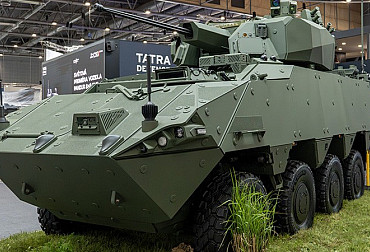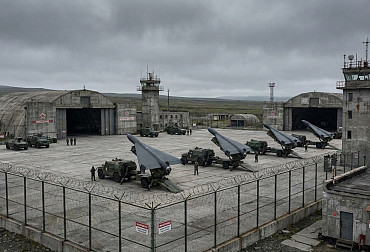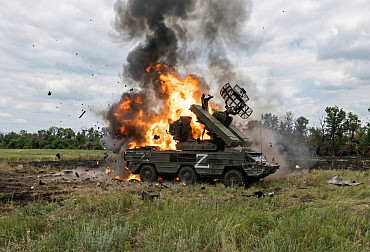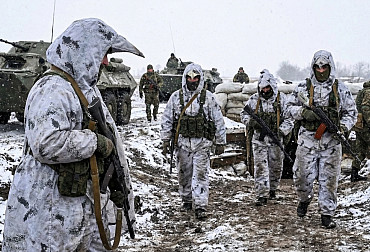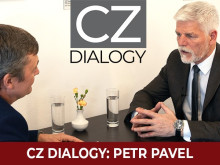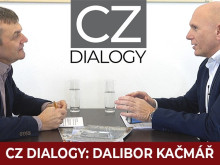Gen. Ivo Střecha: Recruiting, educating, training and retaining our soldiers is one of the biggest challenges
Major General Ivo Střecha is the first Deputy Chief of the General Staff of the Czech Army. His tasks and competences include, among others, the staffing of the army or its operations abroad. From his previous position, he also retains, in agreement with the Chief of General Staff, oversight of strategically important development projects of the Czech Armed Forces. General Střecha accepted the invitation to the next episode of our discussion programme CZ DIALOGY, in which we discussed not only the above-mentioned competences.
Video: Interview with First Deputy Chief of the General Staff of the Army of the Czech Republic Major General Ivo Střecha / CZ DEFENCE
The Czech army or the Czech Republic as a whole has been continuously helping Ukraine since the very beginning of the Russian invasion. We asked if there was anything else we could do for the fighting Ukraine besides material aid or training. "The Czech army is helping in those areas where it has its capabilities. For us the support of the Ukrainian army is really very important. In addition to helping with the supply of various equipment, we are primarily focused on training Ukrainian soldiers, whether it is training specialists in the field of OPZ or EOD, as well as actual combat training. We train the commanders and the units as such. We are aware that this is a huge commitment, a huge responsibility, because these guys are usually not far from us to the front, which means that what they learn here is unfortunately very quickly confronted with reality," says the general, who adds that the training of Ukrainian soldiers must be completed within a few weeks. The training of commanders and staffs extends up to the battalion level, while other training of manoeuvre units is at the platoon-rota level.
According to General Střecha, the mix of Ukrainian soldiers being trained is varied: "The soldiers are recruited from a variety of backgrounds - whether they are people who have some experience with the military, and some of them have specific experience of this conflict, but there are also complete novices. It's quite a challenge for us to balance that and make sure that we synchronize the training to satisfy everybody and make them succeed as best as we can on the battlefield." In addition, the Czech Army has mobile training teams of various specialties that participate in specific training centres within the Alliance.
With the First Deputy Chief of the General Staff of the Czech Army, we also discussed the much-needed modernisation of the Czech Army. "The basic parameter of the level, capability and quality of the Army of the Czech Republic is not only a well-trained soldier, but also a soldier who has the appropriate equipment and armament at the time. And here the Czech Republic owes a great debt to the army. I think that everyone has pointed this out, but if there was no real threat, it is difficult to convince the state or the population in general that we will spend money on tanks and aircraft," General Střecha said on the topic of modernisation.
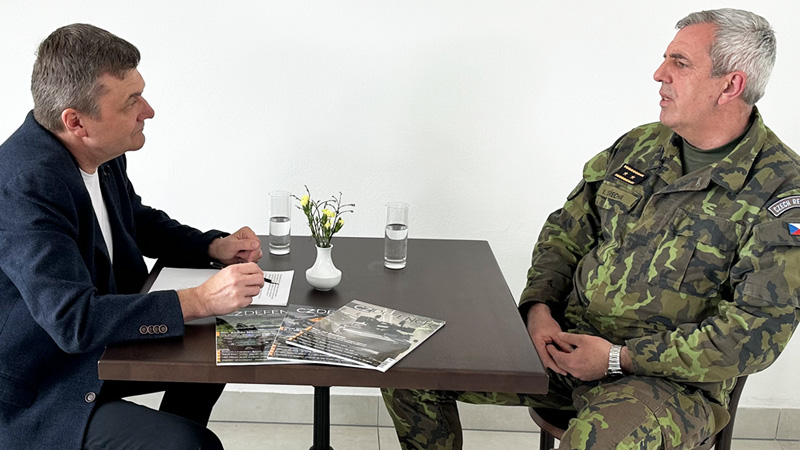 Picture: In this episode of our discussion show CZ DIALOGY, we talked to the First Deputy Chief of the General Staff of the Army of the Czech Republic, Major General Ivo Střecha | Michal Pivoňka / CZ DEFENCE
Picture: In this episode of our discussion show CZ DIALOGY, we talked to the First Deputy Chief of the General Staff of the Army of the Czech Republic, Major General Ivo Střecha | Michal Pivoňka / CZ DEFENCE
The approval of defence spending of 2% of GDP is highly anticipated. However, according to General Střecha, it is not only about the financial debt to the army, but also about the state of personnel and capabilities of the army as a whole. In terms of educating soldiers and commanders, Gen. Střecha said that peacekeeping is no longer the main thing on the minds of soldiers today, soldiers are now thinking about how they would operate on the battlefield in conventional warfare, which Střecha said is a major accomplishment because switching from peacetime affairs to the real war environment of a major conflict is not a matter of one year.
"Alongside that, of course, is the acquisition of modern weaponry, which certainly includes negotiating the acquisition of the F-35 for our air force. The military recommendations were made by my section," says General Střecha, adding: And believe me, when we presented the military recommendation to the Chief of Staff and then to the leadership of the Department, I had several sleepless nights. But I said to myself, first of all, we're not buying an aircraft for ten or twenty years. This aircraft is going to have a mission until 2040, 2050 and beyond. Secondly, after all, fifth-generation aircraft will dominate the European theatre of war at some point in time - a very short time. And third, even if the Czech Army does not use the full potential of what this aircraft can do in the initial phase, our allies can. This means that it is not only for the protection of the Czech Republic's airspace, but we will be involved on the alliance battlefield, and there are already units and countries that can use the potential to a much greater extent," the general explained.
What has long troubled our army is the ability to recruit soldiers and expand their numbers up to the planned level of 30,000, so we asked the general how he sees it. "Well, if there's one thing that doesn't make me sleep well, it's personnel. I say this with absolute sincerity because to recruit, train, retain and maintain this 'life cycle' of personnel is one of the biggest challenges. And I say we buy the aircraft, we buy the tank, we buy everything, we fix the buildings, we build the communications, the information support, but without the personnel, it's not going to do us any good," the general admits. According to him, it is necessary to deal as intensively as possible with how to attract and retain soldiers and how to manage their renewal in order to prevent the ageing of the army. "We can't train a soldier and use him for one capability for 30, 40 years. And if we're at an average age today of something like 40 years, for combat troops around 35, 40 years, something is wrong. We are working on measures to stop and change that. And I think that this is the number one priority for the Chief of General Staff, as well as for me," said Major General Ivo Střecha, 1st Deputy Chief of General Staff of the Czech Armed Forces.
We wanted to know to what extent teamwork works at the General Staff. "It is primarily about teamwork. Cooperation and coordination between the individual sections and cooperation with the Ministry of Defence is absolutely essential. And, of course, the General Staff, which has a lot of responsibility and authority in terms of deciding where the army is going to go, in which direction it is going to develop its capabilities, is in command and control with subordinate commanders," General Střecha said.
Logistical support is currently an important issue not only for our Army but also for the Alliance, so we asked the General about this topic. "I really like to use a statement that my logisticians used to say to me when I commanded a brigade. Logistics is not everything, but everything without logistics is nothing," says the general. When we asked if any new parameters have emerged within logistics in the context of the war in Ukraine, General Střecha replied as follows: "It's just 'old wine in a new bottle', the disciplines are still basically the same. It's about securing combat activity, it's about taking care of personnel, transportation, repairing equipment, etc. The question is how much capacity and capability have we been able to build over the last 30 years, or how much have we lost." Střecha said logistics are being resuscitated. The capacity of the 14th Logistics Support Regiment has been expanded by one battalion, a battalion has been built to support host-nation tasks in alliance operations, etc., so logistics in the ACR is slowly reaching the required level.
The topic of the war in Ukraine is part of all our conversations, so we were interested in General Strecha's assessment of more than a year of the Russian army's presence in Ukraine. "As I watched the initial manoeuvres of the Russian army, it was obvious that there was an underestimation of readiness or preparation, an underestimation of the conditions, an underestimation of the expected actions of the Ukrainians and so on. As far as I could see, the Russians were not even following their own doctrines. However, we should avoid the other extreme, and that is underestimating the Russian military. Just like us, the Russian army is learning and has already been able to take some measures during the conflict," says General Střecha, adding that the Russian army has already been able to take some measures during the conflict to prevent the initial triumph of Russian troops in the early stages of the conflict. Another important fact is the high capability of the Ukrainian army. "What the Ukrainian army has been able to build and train since the seizure of Crimea, hats off to it," said Střecha, who said that in a relatively short period of time an incapable, heavily organised and poorly secured body had become an effective organisation, for which hats off to all those who had a hand in it.
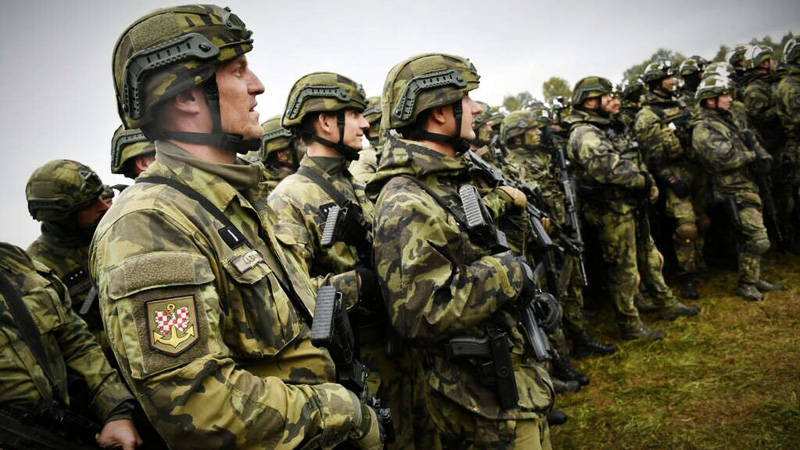 Picture: "If today we are at an average age of something around forty years, for combat units around thirty-five, thirty-four years, then something is wrong. We are working on measures to stop and change this situation," says Major General Ivo Střecha, 1st Deputy Chief of the General Staff of the Czech Armed Forces (illustration photo) | Ministry of Defence of the Czech Republic
Picture: "If today we are at an average age of something around forty years, for combat units around thirty-five, thirty-four years, then something is wrong. We are working on measures to stop and change this situation," says Major General Ivo Střecha, 1st Deputy Chief of the General Staff of the Czech Armed Forces (illustration photo) | Ministry of Defence of the Czech Republic
In the interview with General Střecha, we also discussed the position and importance of the active reserve, the participation of our soldiers in foreign missions and evaluated their contribution. We also talked about the possible revival of certain capabilities of the Czech Army, about the experience or inspiration brought by the training of Ukrainian soldiers on our territory, etc.
If you are interested in our full interview with Major General Ivo Střecha, watch the video at the beginning of this article.











